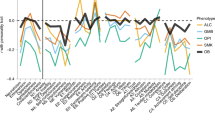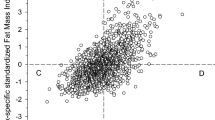Abstract
Psychological comorbidity is high in patients with obesity and is associated with a variety of medical and dietary problems as well as demographic, social and cognitive risk factors. Young overweight and obese women are at particular risk for developing sustained depressive mood, which is an important gateway symptom for major depressive disorder. Increased knowledge of behavioural risk factors has enabled patients with obesity to be classified on a psychological basis and this needs to be considered as part of a patient's clinical assessment and treatment strategy. Increased awareness of abnormal eating behaviour, together with profiling of personality traits, could improve treatment selection for obese women and improve the outcome of weight-loss programmes. Individualised antiobesity drug therapy may be required depending on the patient's psychological characteristics.
This is a preview of subscription content, access via your institution
Access options
Subscribe to this journal
Receive 12 print issues and online access
$259.00 per year
only $21.58 per issue
Buy this article
- Purchase on Springer Link
- Instant access to full article PDF
Prices may be subject to local taxes which are calculated during checkout




Similar content being viewed by others
References
Tuthill A, Slawik H, O'Rahilly S, Finer N . Psychiatric co-morbidities in patients attending specialist obesity services in the UK. Q J Med 2006; 99: 317–325.
Heo M, Pietrobelli A, Fontaine KR, Sirey JA, Faith MS . Depressive mood and obesity in US adults: comparison and moderation by sex, age, and race. Int J Obes 2006; 30: 513–519.
Friedman MA, Brownell KD . Psychological correlates of obesity: moving to the next research generation. Psychol Bull 1995; 117: 3–20.
Gibbons LM, Sarwer DB, Crerand CE, Fabricatore AN, Kuehnel RH, Lipschutz PE et al. Previous weight loss experience of bariatric surgery candidates: how much have patients dieted prior to surgery? Obesity 2006; 14 (Suppl 2): 70S–76S.
Elfhag K, Rossner S . Who succeeds in maintaining weight loss? A conceptual review of factors associated with weight loss maintenance and weight regain. Obes Rev 2005; 6: 67–85.
Field AE, Aneja P, Austin SB, Shrier LA, de Moor C, Gordon-Larsen P . Race and gender differences in the association of dieting and gains in BMI among young adults. Obesity 2007; 15: 456–464.
Elfhag K, Rossner B, Barkeling B, Rooth P . Sibutramine treatment in obesity: initial eating behaviour in relation to weight loss results and changes in mood. Pharmacol Res 2005; 51: 159–163.
Hainer V, Kunesova M, Bellisle F, Hill M, Braunerova R, Wagenknecht M, STO Study Group. Psychobehavioural and nutritional predictors of weight loss in obese women treated with sibutramine. Int J Obes 2005; 29: 208–216.
Elfhag K, Finer N, Rossner S . Who will lose weight on sibutramine and orlistat? Psychological correlates for treatment success. Diabetes Obes Metab [e-pub ahead of print: 26 June 2007; doi:10.1111/j.1463-1326.2007.00740.x].
Bray GA, Blackburn GL, Ferguson JM, Greenway FL, Jain AK, Mendel CM et al. Sibutramine produces dose-related weight loss. Obes Res 1999; 7: 189–198.
Finer N, Ryan DH, Renz CL, Hewkin AC . Prediction of response to sibutramine therapy in obese non-diabetic and diabetic patients. Diabetes Obes Metab 2006; 8: 206–213.
Hansen D, Astrup A, Toubro S, Finer N, Kopelman P, Hilsted J, et al., For the STORM study group. Predictors of weight loss and maintenance during 2 years of treatment by sibutramine in obesity. Results from the European multi-centre STORM trial. Int J Obes Relat Metab Disord 2001; 25: 496–501.
Elfhag K, Rossner S, Carlsson AM, Barkeling B . Sibutramine treatment in obesity: predictors of weight loss including Rorschach personality data. Obes Res 2003; 11: 1391–1399.
Kaukua JK, Pekkarinen TA, Rissanen AM . Health-related quality of life in a randomised placebo-controlled trial of sibutramine in obese patients with type II diabetes. Int J Obes Relat Metab Disord 2004; 28: 600–605.
Author information
Authors and Affiliations
Corresponding author
Rights and permissions
About this article
Cite this article
van der Merwe, MT. Psychological correlates of obesity in women. Int J Obes 31 (Suppl 2), S14–S18 (2007). https://doi.org/10.1038/sj.ijo.0803731
Published:
Issue Date:
DOI: https://doi.org/10.1038/sj.ijo.0803731
Keywords
This article is cited by
-
Physical activity and health-related quality of life among high-risk women for type 2 diabetes in the early years after pregnancy
BMC Women's Health (2022)
-
U-shaped association between body mass index and health-related quality of life impairment in Korean cancer survivors: a nationwide representative cross-sectional survey
Journal of Cancer Survivorship (2022)
-
Age-dependent hepatic alterations induced by a high-fat high-fructose diet
Inflammation Research (2019)
-
The effect of weight loss intervention programme on health-related quality of life among low income overweight and obese housewives in the MyBFF@home study
BMC Women's Health (2018)
-
Prevalence of anxiety and depressive symptoms among obese pregnant and postpartum women: an intervention study
BMC Public Health (2010)



